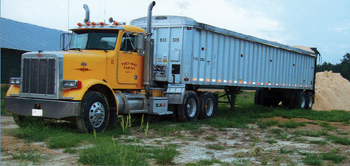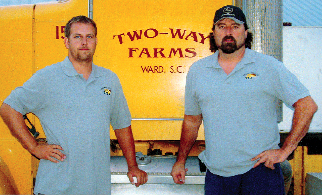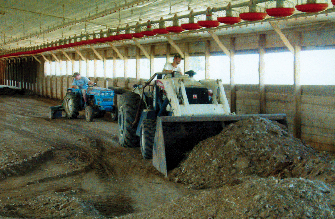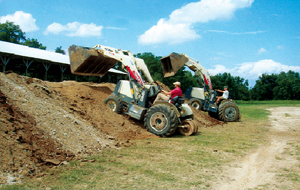
Two Way Services LLC, a commercial
poultry litter management business based in South Carolina—and run by
two growers—is growing steadily, doing poultry house cleanouts all over
the state and moving an estimated 25,000 tons of litter a year.
 Two Way Services LLC tries to haul litter the least distance—it’s efficient and it reduces fuel charges for customers. Two Way Services LLC tries to haul litter the least distance—it’s efficient and it reduces fuel charges for customers. |
Two Way Services LLC, a commercial poultry litter management business based in South Carolina—and run by two growers—is growing steadily, doing poultry house cleanouts all over the state and moving an estimated 25,000 tons of litter a year.
Four years ago John Koon asked his cousin, Jason Holsomback, if he wanted to join him in buying into a commercial poultry litter cleanout business in Ward, South Carolina. For Koon, already a poultry farmer with five broiler houses, it was a good fit.
Holsomback had recently graduated in cardiac rehabilitation, had only worked a year in his field and had never raised poultry. The fit for him wasn’t as readily apparent. But since they teamed up, their company—Two Way Services—has tripled in size and is still growing.
 With an equipment fleet that continues to grow, Two Way Services LLC manages the poultry litter of approximately 400 houses, most of them within a 65-mile radius of its base in Ward, South Carolina. With an equipment fleet that continues to grow, Two Way Services LLC manages the poultry litter of approximately 400 houses, most of them within a 65-mile radius of its base in Ward, South Carolina. |
The company performs cleanouts all over the state, with most of the houses within a 65-mile radius. They manage approximately 400 houses and move an estimated 25,000 tons of litter a year. It takes six employees and several part-time staff to handle the workload, which is primarily broiler houses, but also includes breeder, pullet, and a few layer houses. In addition to cleaning, Koon and Holsomback have divided up the managing responsibilities—Koon handling the soil contracts and soil samples, while Holsomback oversees the billing. So far it’s working fine.
 Jason Holsomback (left) and John Koon of Two Way Services LLC. Since the two men teamed up, Two Way Services has tripled in size and is still growing. Jason Holsomback (left) and John Koon of Two Way Services LLC. Since the two men teamed up, Two Way Services has tripled in size and is still growing. |
The two men are technically manure brokers. “In South Carolina you need a manure broker’s license to handle litter the way we do and in this capacity,” says Koon. “We set up contracts with the growers. We do the cleaning, but we also take care of all the paperwork—the manure analysis and the soil samples where it’s being applied. It takes a big burden off the growers.”
Poultry farmers are given a variety of options. They can choose from services that range from simply cleaning out their facility with the farmer doing the paperwork himself, to a three-year contract that sees Two Way Services handle everything including housekeeping, a full cleanout, applying the manure and all the paperwork.
Most of their customers choose the latter. “Every nine weeks we know when it’s about time to go in and do their work,” says Holsomback. “We’ll do a ‘crust out’ where we take the wet litter out of the house and leave nothing but the dry litter on the floor. It reconditions it for the new chickens coming in. Then once a year, we’ll take in the industrial loader and clean houses out to the ground. If it all works out right, every day we’re doing something somewhere.”
Why are so many farmers looking for commercial cleanout services rather than doing it themselves? Koon and Holsomback say there are a number of reasons.
- A well needed break: “When their chickens go out, the farmers have a week and a half before they get the next ones in. A lot of people like to take off and enjoy those days. It would take almost that entire time if they had to do all the work themselves,” explains Holsomback. “We’ll even put sawdust in the house for them, too, so all they have to do is come in and set their equipment up and they’re ready for their next flock.”
- Costs savings: For even an eight-house farm, it would be hard to justify buying all the equipment, especially since some of it is only used four times a year.
- No hassles from DHEC (Department of Health & Environmental Control): In South Carolina, if there is a complaint about odor or how the manure was spread, DHEC is contacted and must check it out. “The farmers are supposed to send them to us and that’s when we have to have that paperwork ready to show them—the soil sample, the manure analysis. We’re responsible for having done everything right,” says Koon.
For Koon and Holsomback, the ideal contract is one where they are paid for cleaning out the litter from the barn, and they then turn around and sell the litter to farmers growing crops such as cotton, peaches and corn. “We also do a lot of cattle operations and spread on pasture lands,” says Koon. “Some of it we just send off in bulk. We have a tractor trailer and can move it out of state or we’ll truck and trailer it to farmers and they’ll spread it themselves.”
 The company has six employees and several part-time staff to handle the cleaning workload, which consists primarily of broiler houses, but also includes breeder, pullet and a few layer houses. The company has six employees and several part-time staff to handle the cleaning workload, which consists primarily of broiler houses, but also includes breeder, pullet and a few layer houses. |
They have learned that depending on the type of house, the litter can differ significantly. Broiler houses, for example, have a higher nitrogen level and the litter is a little drier. Breeder houses, on the other hand, are moist and contain more calcium and potash.
“Some farmers get it in their minds that one litter is a whole lot better than another one,” says Koon, “But we’ve got pretty good customers who will buy if we have something close to them. We try to gauge it so it’s hauled the least distance—it’s better for us, and we don’t have to charge them as much for fuel costs.”
When they do spread, Two Way Services uses a two-ton truck with a Chandler spreader body consisting of floor chains and spreader paddles on the back. “We just apply the desired amount of tons per acre and we can gauge that on the spreader body,” says Koon.
Since they are constantly working on one or more jobs, they have a growing fleet of equipment:
- four industrial low profile loaders for cleaning the houses: two Terex 640s, one Massey Ferguson 50EX, and a Massey Ferguson 640;
- three Chandler spreader trucks, with another on the way;
- three tractors: a Massey Ferguson 375, a Farm Trac 550 and a Massey Ferguson 3445;
- three KMC housekeepers used to crust out;
- a brand new Peterbilt truck with a 42-foot Red River belt drive trailer for bulk litter and shavings transport.
Work is heaviest for the men and their crew January through June. “Most people are planting in the springtime and want to get the litter on their land right before they plant,” says Koon. They put in long hours seven days a week for the entire six months.
The challenge for the men is keeping the equipment in working order. There is no such thing as downtime, especially during the busy season. “You have to work through it. As a matter of fact, last night we had two guys that worked all night. Usually, we don’t like to work at night because it’s harder in the dark just using headlights. But sometimes we just have to do what we’ve got to do,” says Holsomback.
“Learning how to maintain the equipment better was probably the biggest thing we picked up on real quick. We tried to hire it all out to start with, then realized we had a tremendous maintenance bill at the end of the year,” he explains. “We got somebody in who could work on stuff a whole lot better than we could. But we still have a little learning curve there.”
Luckily, work slacks off a bit in the summer when both Koon and Holsomback need to stick close to their own poultry businesses. (Koon now has three broiler houses and Holsomback built four broiler houses three years ago.) “It wouldn’t take but a couple of minutes if something were to go wrong in this heat. The humidity is the real killer,” says Koon.
While they monitor their own farms, they look to their four full-time employees to handle the cleanout business and to be where they need to be.
“Sometimes its slow enough we have to find extra work for them,” says Holsomback. “We’ll put them on our own personal farms (which are side by side, with an acre between them designated for Two Way Services). A lot of times we let them have days off during the summer or work half days. It all balances out with the seven days a week in the spring.”
 Poultry farmers are given a variety of options with Two Way Services. They can choose from services that range from simply cleaning out their facility with the farmer doing the paperwork himself, to a three-year contract that sees Two Way Services handle everything including housekeeping, a full cleanout, applying the manure and handling all the paperwork. Most customers choose the latter option. Poultry farmers are given a variety of options with Two Way Services. They can choose from services that range from simply cleaning out their facility with the farmer doing the paperwork himself, to a three-year contract that sees Two Way Services handle everything including housekeeping, a full cleanout, applying the manure and handling all the paperwork. Most customers choose the latter option. |
With the chicken business booming in South Carolina and new houses being built every month, Koon and Holsomback are now facing a little competition. “We kind of had a monopoly on it, but there have been a few others that have sprouted up. And a couple of them are hanging in pretty good, so we’re competing to get the new farmers under contract before they build,” says Holsomback.
“We’ve had a lot of people that I call ‘fly-by-nights’ because they jump into it and don’t realize what they’re getting into,” he adds. “A lot of homework has to be done on it before you do it, because it’s not for everybody. It’s pretty demanding and, of course, you smell bad every day.”
In addition to the competition, they are also dealing with rising fuel prices. In the last 20 months they have had to increase their prices twice—something they’ve never done before. “We should really increase it more, but we try to meet the farmers half way,” says Koon.
But the rising fuel prices have also been a boom to the company as well. Commercial fertilizer prices have skyrocketed and created a greater demand for litter. “We could pretty much name our price this year,” says Holsomback. “And there were some we couldn’t even get to because we didn’t have enough litter.”
But despite the ups and down, the smell and the hours, Koon and Holsomback are still enjoying the work and gearing up for growth. “We’re steadily taking on new customers. And we’re trying to stay ahead of the curve as far as having equipment and having help to do that,” explains Holsomback. “It’s great work.”